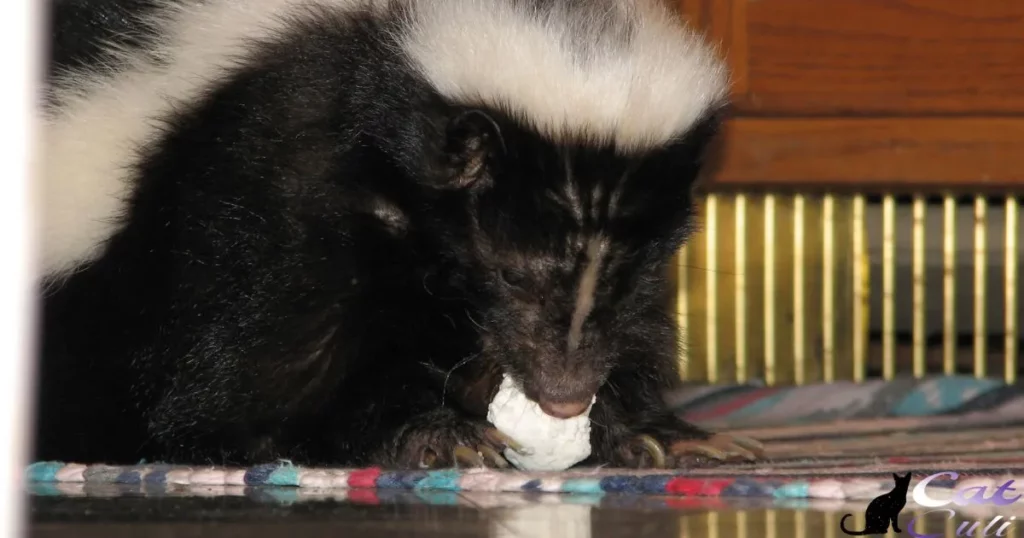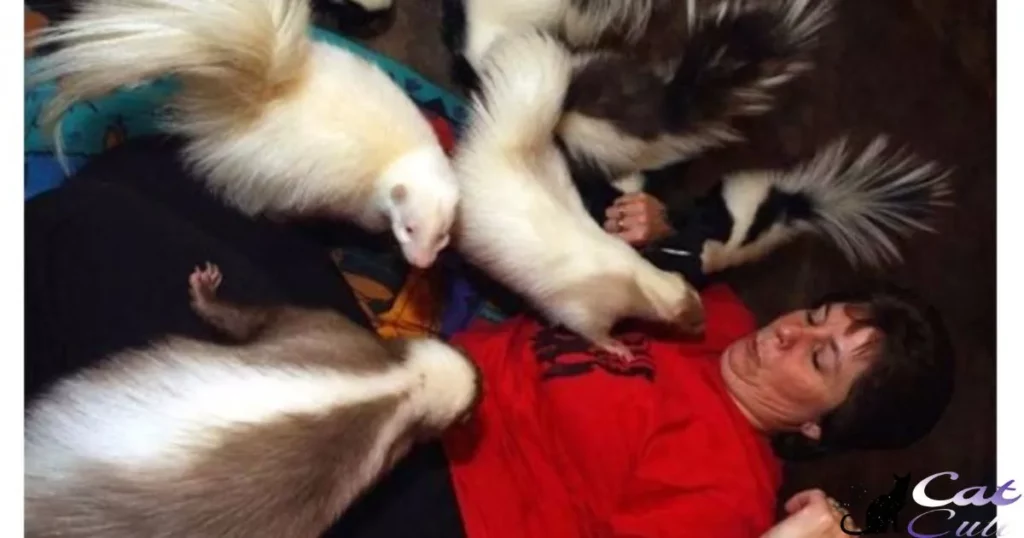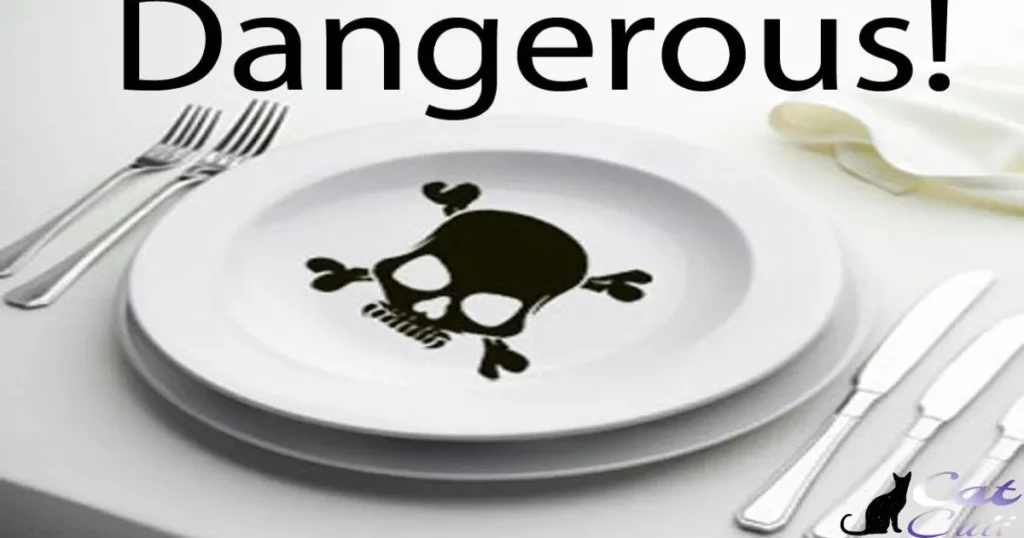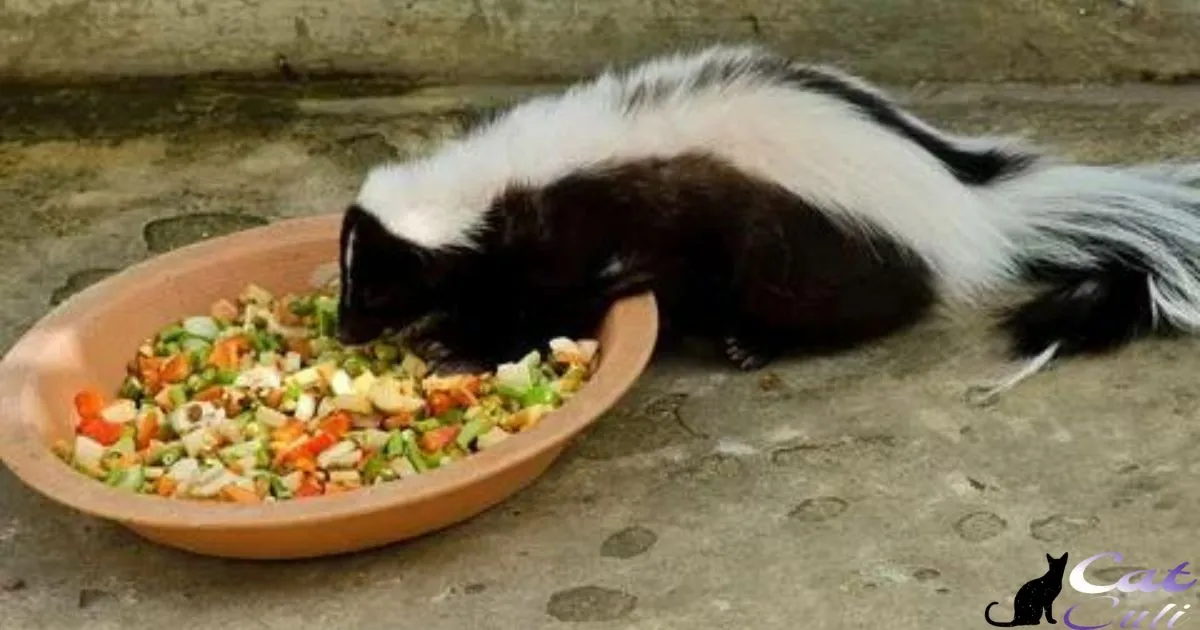Skunks can eat cat food as part of their diet. They are omnivores and can consume various foods, including fruits, insects, and pet food. Feeding skunks cat food should be done in moderation as it might not provide all the nutrients they need. Too much cat food can lead to health issues for skunks.
Curious about the dining habits of our furry neighbours. Can skunks eat cat food? Prepare to explore the surprising culinary preferences of these omnivorous creatures! Dive into this intriguing inquiry to uncover whether cat food makes it onto the menu for these black-and-white foragers.
Shedding light on whether these critters indulge in cat food. Discover more about these omnivores and their potential appetite for the same food that tempts our feline friends. Stay tuned to unravel the mystery behind what satisfies the taste buds of these black-and-white mammals.
What To Feed A Skunk
Skunks thrive on a diverse diet that includes both plant and animal-based foods. Offer them a mix of fruits, vegetables, and lean proteins like cooked chicken or turkey. Cat food can be given occasionally, but it shouldn’t be their primary diet as it might lack essential nutrients.
Incorporate leafy greens, berries, and small amounts of nuts or seeds into their meals for variety. Avoid feeding them dairy, sugary, or processed foods, and always ensure freshwater is available. A balanced diet keeps these furry foragers healthy and happy.
Are Skunks Attracted To Cat Food?
Skunks find cat food alluring due to its strong scent and palatable flavours. Their keen sense of smell makes them drawn to the enticing aroma of cat food left outside. When cat food is accessible, skunks might visit urban or suburban areas, enticed by this readily available food source.
Ensuring cat food is not left outside overnight can help deter skunks. Placing pet food indoors or in secure containers minimizes the chance of attracting these curious creatures, reducing potential encounters between skunks and residential areas.
Keep Your Skunk Away From Your Garbage
Skunks are attracted to garbage due to the scent of food. To keep your skunk away, secure your trash cans tightly with lids that latch. Ensure the cans are not easily accessible or tipped over, preventing these creatures from scavenging for leftovers. Regularly remove any food scraps or spills around the trash area to eliminate enticing odours.
It’s crucial to manage garbage properly to deter skunks from your property. By taking preventive measures like sealing trash bins and maintaining cleanliness, you reduce the likelihood of these animals seeking out your garbage as a potential food source, minimizing encounters with skunks around your home.
What Do You Feed A Wild Skunk?
Feeding a wild skunk involves providing a balanced diet. They enjoy fruits, vegetables, insects, and even some commercial pet foods. Opt for a mix of protein and veggies to keep them healthy. Avoid dairy and overly processed foods as they might upset their stomachs. A diverse diet is key to keeping these critters content and healthy in the wild.
Fruits like berries, apples, and melons, along with veggies such as carrots and leafy greens, make excellent additions. Note that squirrels eat cat food, so be cautious with its placement to avoid unintended guests. Strive for a varied diet to mimic their natural foraging habits.
The Consequences Of Feeding Wildlife In California
Feeding wildlife in California carries serious consequences. It can disrupt their natural behaviours and diets, leading to health issues and dependency on humans. This practice can also attract more animals than the environment can support, causing imbalances in ecosystems and conflicts between wildlife and humans.
Furthermore, feeding wildlife in California is often prohibited by state laws and regulations. These laws aim to protect both the animals and people. By avoiding feeding wild animals, individuals help maintain a balanced and healthy environment for California’s diverse wildlife populations.
Do Skunks Eat Dry Cat Food

Skunks do eat dry cat food as it appeals to their omnivorous nature. They’re drawn to its protein-rich content and find it quite appetizing. Their diet typically includes a mix of insects, fruits, and even small mammals, with dry cat food serving as a convenient and palatable addition to their menu.
Dry cat food, with its protein and fat content, is often enticing to skunks. Their omnivorous tendencies make this kibble a suitable option among their diverse food choices. Skunks actively seek out this source of nutrition, incorporating it into their diet alongside other foods found in their natural habitat.
Why Is My Dog Shedding Excessively Even In Winter?
Dogs shed excess fur in winter due to changes in temperature and light, not just because of warmth. This shedding helps them adapt to the changing seasons. Certain breeds, like Huskies or Malamutes, shed more in winter to make way for a thicker, insulating coat.
Regular grooming can manage excessive shedding by removing loose fur and keeping their coat healthy, reducing the mess in your home.Seasonal changes trigger your dog’s shedding, causing them to lose more fur than usual during winter.
This process, called blowing coat, is a natural way for dogs to adjust to temperature variations. Keeping up with grooming routines and a balanced diet helps manage shedding, ensuring your furry friend stays comfortable year-round.
How Do You Teach A Dog His Name? A Guide To Using Positive Methods
Teaching your dog their name involves using positive methods. Begin by saying their name cheerfully and rewarding them when they respond by looking or coming to you. Repetition and consistent praise help dogs associate their name with something positive, making the learning process enjoyable for them.
Positive reinforcement, like treats or praise, encourages dogs to learn their name quickly. Practice in different environments to reinforce their understanding. With patience and positivity, your furry friend will soon respond to their name with enthusiasm and joy.
8 Brilliant Hacks To Keep Cats Out Of The Christmas Tree
- Aluminium foil: Cover the base of the tree with foil to deter cats from walking on it.
- Elevated tree: Place the tree on a sturdy elevated surface to make it less accessible to cats.
- Secure ornaments: Hang ornaments securely, preventing cats from batting them around.
- Bitter apple spray: Apply this cat deterrent on the lower branches to discourage chewing.
- Tree skirt deterrents: Use double-sided tape or aluminium foil on the tree skirt to deter cats.
- Motion-activated deterrents: Install devices that emit a sound or spray when the cat approaches the tree.
- Provide distractions: Offer alternative toys or climbing structures to divert their attention from the tree.
Are There Any Commercially Available Skunk Foods?
Commercial skunk foods are available in some pet stores and online. These foods are specifically formulated to meet the nutritional needs of skunks. They often contain a mix of protein sources, fruits, vegetables, and essential vitamins and minerals tailored for these furry omnivores.
Availability may vary depending on location, so it’s wise to check with local pet suppliers or browse online to find these specialized diets.These commercial skunk foods aim to provide a balanced diet for these creatures.
They typically offer a convenient and reliable option for skunk owners who want to ensure their pets receive proper nutrition without the hassle of preparing homemade meals. Checking ingredients and consulting with a veterinarian can help in selecting the best commercially available skunk food for your pet.
Can I Have A Pet Skunk?

Sure, having a pet skunk is legal in some places, but it depends on your local laws. Skunks can make affectionate and playful pets when descented, but they do require specific care. They need a special diet and regular veterinary check-ups to ensure their health.
It’s crucial to research and understand the legalities and responsibilities before considering a skunk as a pet.Skunks, as pets, need a lot of attention and a safe environment. They can be trained like cats or dogs and may form strong bonds with their owners.
Owning a skunk demands commitment, as they have specific needs and can live up to a decade or more in captivity. It’s important to thoroughly assess whether you can provide the necessary care and meet legal requirements before deciding to have a skunk as a pet.
What Not To Feed To A Skunk
Skunks have particular dietary needs, so it’s crucial to know what foods are a big no-no for them. Chocolate, onions, and citrus fruits are among the items you should avoid feeding skunks. These foods can be harmful and cause digestive issues for these curious omnivores.
Dairy products like milk and cheese should also be kept away from their diet, as skunks are lactose intolerant.Steer clear of feeding skunks foods high in fat or sugar content, such as junk food or sweets.
These can lead to obesity and other health problems for these little striped creatures. Always prioritize their well-being by offering a balanced and suitable diet to keep these charming animals healthy and thriving.
A Healthy Skunk Diet
Skunks thrive on a healthy diet that includes fruits, vegetables, insects, and some meat. Their menu typically consists of berries, nuts, insects like beetles and grasshoppers, and occasionally small mammals or eggs. A balanced diet helps skunks stay active and maintain their overall health.
Offering skunks a mix of foods like leafy greens, carrots, and lean proteins keeps them nourished. It’s important to avoid too much processed food or high-fat content, as it can lead to health issues for these curious omnivores. A varied and nutritious diet ensures these furry creatures stay happy and healthy.
What Do Pet Skunks Eat?
Pet skunks have diverse tastes, munching on a blend of fruits, vegetables, and proteins. They relish cooked meats like chicken and turkey alongside leafy greens such as spinach or kale. This omnivorous appetite extends to cat food and specific dog foods that are high in protein, making them quite the flexible eaters.
Their diet often includes commercial skunk food, which provides essential nutrients in precise quantities. Mixing this with fresh foods like berries or carrots ensures a balanced diet for these adorable, furry companions. Skunks thrive on a varied menu, encompassing both specially formulated foods and natural, wholesome treats.
The 4 Ways To Keep Cats Safe From Skunks
| Method | Description |
| Secure Trash Bins | Keep trash bins tightly closed to prevent attracting skunks looking for food scraps. |
| Outdoor Lighting | Install motion-activated lights to deter skunks and make outdoor areas less inviting. |
| Secure Pet Doors | Ensure pet doors are inaccessible to skunks to prevent them from entering the house. |
| Supervise Outdoor Time | Supervise cats when outdoors, especially during dusk and dawn, prime skunk activity. |
How Does Your Pet Care Facility Rank On Sanitation?
Want to know how your pet care facility stacks up in terms of cleanliness? Assessing sanitation levels at your facility ensures a safe and healthy environment for furry companions. Regular inspections and maintenance help gauge the facility’s cleanliness standards, promoting a top-notch experience for pets and peace of mind for owners.
A clean pet care facility is crucial for maintaining a healthy atmosphere. Evaluating sanitation levels regularly guarantees a high standard of hygiene, fostering a comfortable and secure space for your beloved pets. Regular checks and upkeep signify a commitment to providing a pristine environment, ensuring your furry friends receive the best care possible.
5 Surprising Tips For Deterring Skunks From Visiting Your Home
Try these surprising tips! First, secure your trash cans tightly to prevent skunks from rummaging through them. Eliminate any food sources outside, like pet food left overnight. Consider using motion-activated lights or sprinklers to startle skunks away.
With these strategies, you can deter skunks from visiting your home and keep your surroundings skunk-free. Deterring skunks from your home is easier than you might think! Begin by sealing off any potential entry points beneath porches or decks to prevent skunks from nesting.
Planting strong-smelling herbs like mint or lavender can repel skunks due to their scent. Finally, regularly mow your lawn and trim bushes to remove hiding spots for these critters. By implementing these unexpected tips, you can effectively discourage skunks from making your home their hangout spot.
Remove Their Food Source
Eliminate accessible food sources that may attract skunks, such as unsecured trash, fallen fruits, or leftover pet food.
Feed Your Pets Inside
Avoid leaving pet food outside overnight, as it can attract skunks. Feed your pets indoors to prevent luring these critters.
Seal Everything properly
Seal Everything Properly: Close off any potential entry points to your home, like gaps under decks or sheds, to prevent skunks from entering and nesting.
Consistency Is Key
Consistency Is Key: Maintain a consistent routine in securing trash cans, cleaning up outdoor food sources, and sealing entry points to effectively deter skunks from frequenting your property.
Odour-Removing Products
Odour-Removing Products: Use odour-neutralizing or repelling products specifically designed to deter skunks. These products can help mask scents that may attract skunks to your property.
What Food Is Poisonous To Skunks

Skunks need a cautious eye when it comes to their diet, as certain foods can be poisonous to them. Chocolate, for instance, is highly toxic and can cause severe health issues for skunks if ingested. Onions and garlic, commonly found in many human dishes, are also harmful to skunks and should be kept away from their reach.
It’s essential to ensure that the food given to skunks doesn’t contain these toxic elements to keep them safe and healthy.Avocados are another food that poses a threat to skunks due to a substance called person found in their pits and skin.
Grapes and raisins should be avoided as well, as they have been linked to kidney failure in certain animals, including skunks. Being mindful of these potentially poisonous foods is crucial in safeguarding the well-being of skunks and preventing any health complications that might arise from accidental consumption.
Why Is Cat Food Poisonous To Skunks
Cat food can be harmful to skunks due to its high protein and fat content. This food isn’t tailored to skunks’ nutritional needs, leading to health issues when consumed regularly. The ingredients and nutrient balance in cat food may cause digestive problems or obesity in skunks, posing a risk to their well-being.
Skunks’ bodies can’t handle certain elements found in cat food, resulting in potential toxicity. Ingredients like preservatives, artificial flavours, or high levels of certain minerals may harm their digestive systems or even lead to organ damage. Therefore, offering cat food to skunks can be poisonous and detrimental to their health.
Can Skunks Eat Bread
Skunks can eat bread as part of their diet. They are omnivores and enjoy a diverse range of foods, including fruits, insects, and human food like bread. Offering bread should be in moderation as it might not provide all the essential nutrients skunks need for a healthy diet.
If considering feeding skunks bread, it’s important to note that their diet should be balanced. While they may nibble on bread, it shouldn’t be the primary source of their nutrition. Providing a varied diet ensures skunks receive the necessary vitamins and minerals essential for their well-being.
Do Skunks Eat Bird Seed
Skunks are known for their diverse diet, which includes various foods like fruits, insects, and even small mammals. When it comes to bird seed, skunks might indulge in it occasionally, attracted by the seeds’ scent and taste. They are opportunistic feeders and may nibble on bird seed if they find it accessible, but it’s not a primary part of their diet.
It’s essential to secure bird feeders or store bird seed in containers that skunks can’t access easily. Skunks visiting bird feeders might cause a mess or disturb other wildlife attracted to the seeds, so taking precautions can help manage their interaction with bird seed.
Do Skunks Kill Cats
Skunks generally don’t actively seek out cats to kill. They’re more inclined to spray when threatened rather than attack. In rare cases, if a skunk feels cornered or threatened by a cat, it might defend itself by spraying or, in extreme situations, biting.
Cats, being curious and playful, might engage with skunks out of curiosity, leading to altercations, but these instances are uncommon. It’s important to keep an eye on your pets and discourage interactions with skunks to prevent any potential conflicts.
FAQ’s
What food is poisonous to skunks?
Avocado, chocolate, onions, and grapes can be toxic. Avoid feeding them dairy and high-fat foods.
What can you feed a skunk?
Offer a balanced diet: fruits, veggies, insects, cooked meats, and specially formulated skunk food.
Why do skunks like cat food?
Skunks find cat food palatable due to its protein content and flavour, but it may lack essential nutrients.
Conclusion
In the realm of skunk dining habits, the question, Can skunks eat cat food? raises curiosity. While skunks may munch on cat food occasionally, it’s not their primary dietary choice. Their omnivorous nature invites them to explore various food sources, including insects, fruits, and plants.
Understanding skunks’ preferences allows for better care. While they might enjoy the taste of cat food, providing a diverse range of foods ensures their nutritional needs are met. Hence, while the occasional nibble might not harm, a well-rounded diet is key to keeping these black-and-white critters healthy and thriving.








